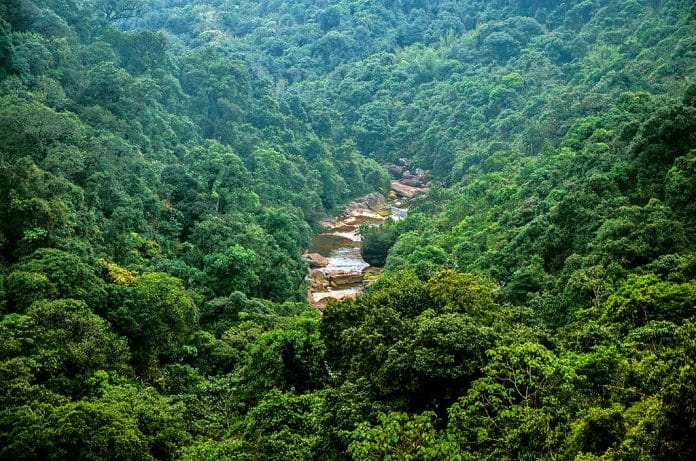New Delhi: Meghalaya may lose the status of being home to the two wettest places on Earth — Mawsynram and Cherrapunjee — if data from a remote town in Indonesia is endorsed by the World Meteorological Organisation (WMO).
Mile 50, on a remote mining road in Papua province, has reportedly recorded more rain than anywhere else globally in the last five years. The rain gauge maintained by the Meteorology, Climatology and Geophysics Agency of Indonesia and mining company Freeport Indonesia at Mile 50 has recorded an average of 12,143 mm of rainfall.
This is 478.071 inches or 39 feet and 8 inches of precipitation, enough to challenge Mawsynram’s 467 inches of rain and Cherrapunjee’s rainfall that is just about 100 mm short of Mawsynram’s average.
The Papua data, however, has to be first endorsed by the the WMO.
World’s largest number of pygmy hogs are in Assam
The pygmy hog, the world’s rarest and smallest pig, has been thriving in the Orang National Park of Assam. According to a report, the largest population of about 150 pygmy hogs are to be found in Orang today. This is all thanks to a breeding programme set up in 1995 by Goutam Narayan, in collaboration with the Durrell Wildlife Conservation Trust.
The breeding programme for the foot-tall hogs was started near Guwahati, with six animals trapped in the Manas National Park of Assam. Three of the females were already pregnant then, adding to the genetic diversity of the small founding stock, Narayan said.
Of the nearly 400 piglets that survived to adulthood, 130 were released into the Sonai Rupai Wildlife Sanctuary as well as Orang and Manas. Some were also released in the Barnadi Wildlife Sanctuary.
Not a quarantine centre, this is a Covid ‘creativity hub’
A community quarantine centre in Chizami village in Nagaland’s Phek district has been transformed into what residents and its Covid-19 task force call a “creativity hub”. Those quarantined here are encouraged to write poems, paint and sketch during their 14-day stay.
“We wanted our returnees to stay positive and make the best use of their 14-day stay at the facility, exploring their creative talents and abilities to create and make positive stuff so as to spread positivity in the midst of the global gloom,” Wetshete Joseph Thopi, convenor of the Chizami Covid-19 task force, said.
The North East Network (NEN) has even provided tools and stationery kits for the inmates. Seno Tsuhah of the Chizami NEN has said, “When it comes to quarantine centres, the returnees are mostly young and energetic people and we felt that it would be important to give them notebooks where they can scribble … and since not all of them may be comfortable writing, we also gave colours.” The NEN will also publish the sketches and other works by returnees.
Moreover, the bamboo huts built for the returnees have been personalised, with each having access to a small courtyard, pantry and a separate toilet. Food here is served in leaves to reduce dependence on plastic.
Meghalaya’s annual festival to drive away plague begins
The annual Behdienkhlam festival, which is observed by the Pnars of the Jaintia hills in Meghalaya to get rid of plague or illness, has kicked off. It assumes a greater relevance this year due to the Covid-19 pandemic.
Behdienkhlam, which means ‘to drive away plague/pest/pandemic’, deals with the concept of community and its religion. Usually celebrated during monsoon, the festival began last week and will culminate Wednesday.
“Our world is facing a great danger that threatens the lives of millions of people due to the spread of the coronavirus. During this Behdienkhlam, we call on God, U Tre Kirot, to end the pandemic and heal those who are afflicted with the virus,” said Omarlin Kyndiah, general secretary of the Sein Raij Niamtre in Shillong.
In light of Covid, the festival is being celebrated with restrictions, limited to only rites and rituals that do not involve community or mass gatherings.






